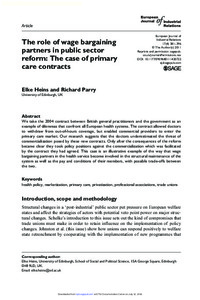The role of wage bargaining partners in public sector reform: the case of primary care contracts

European Journal of Industrial Relations
2011
17
4
December
381-396
health policy ; medical care ; privatization ; public sector ; trade union role
Social protection - Health policy
English
Bibliogr.
"We take the 2004 contract between British general practitioners and the government as an example of dilemmas that confront all European health systems. The contract allowed doctors to withdraw from out-of-hours coverage, but enabled commercial providers to enter the primary care market. Our research suggests that the doctors underestimated the threat of commercialization posed by these new contracts. Only after the consequences of the reform became clear they took policy positions against the commercialization which was facilitated by the contract they had agreed. This case is an illustrative example of the way that wage bargaining partners in the health service become involved in the structural maintenance of the system as well as the pay and conditions of their members, with possible trade-offs between the two."
Digital
The ETUI is co-funded by the European Union. Views and opinions expressed are however those of the author(s) only and do not necessarily reflect those of the European Union or the ETUI.